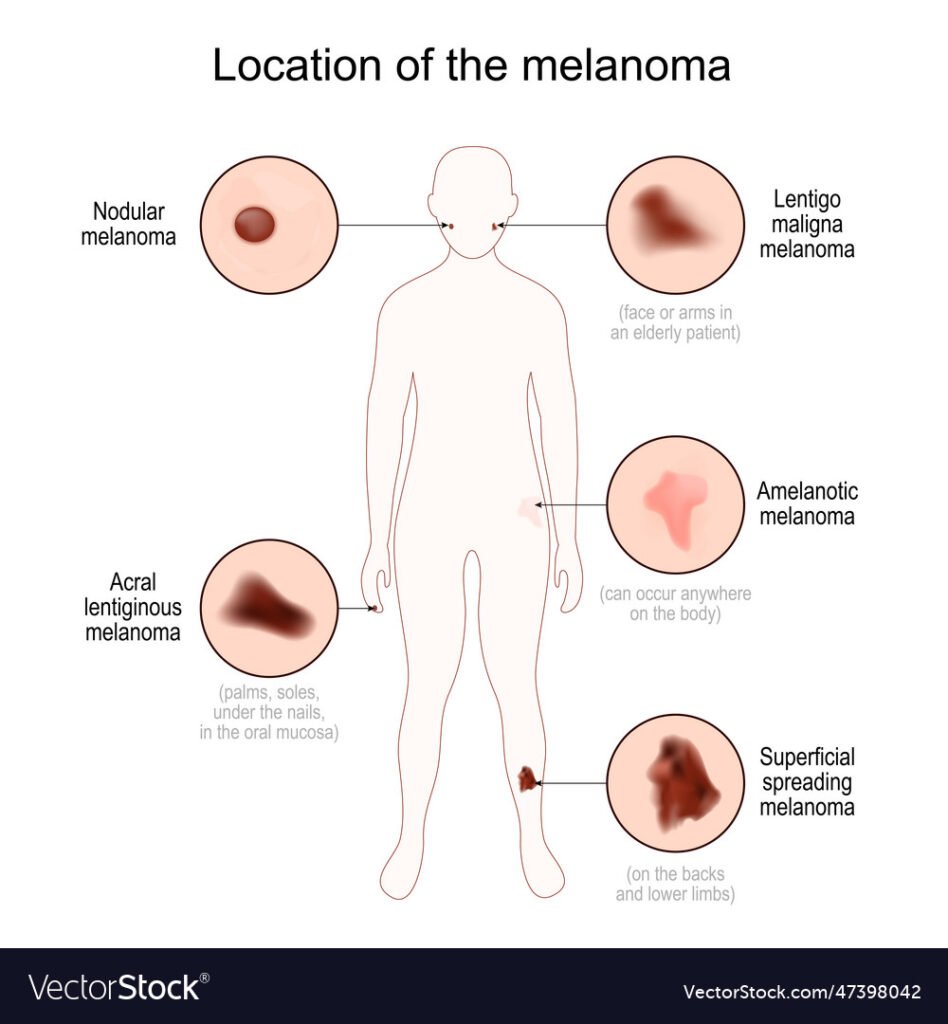Melanoma Skin Cancer
What Is Melanoma Skin Cancer?
Melanoma Skin Cancer
Cancer is the growth of abnormal cells that take over neighboring cells and tissues and, at later stages, also spread to organs. When such cells start at the skin, they cause skin cancer. Melanoma is cancer that begins in the melanocytes. Other names for this cancer include malignant melanoma and cutaneous melanoma.

What Are The General Symptoms Of Melanoma Skin Cancer?
New spots on the skin that change shape, size or colour or look different from your other spots, are the most prominent warning signs. The ABCDE rule is another guide to the usual signs of melanoma.

- A is for Asymmetry :One half of a mole or birthmark does not match the other.
- B is for Border :The edges are irregular, ragged, notched, or blurred.
- C is for Color : The color is not the same all over.
- D is for Diameter : The spot is larger than 6 millimeters across (about ¼ inch – the size of a pencil eraser), although melanomas can sometimes be smaller than this.
- E is for Evolving : The mole is changing in size, shape, or color.
Other warning signs are:
- A sore that does not heal
- The spread of pigment from the border of a spot into the surrounding skin
- Redness or a new swelling beyond the border
- Change in sensation – itchiness, tenderness, or pain
- Change in the surface of a mole – scaliness, oozing, bleeding, or the appearance of a bump or nodule

What Are The General Causes Of Melanoma Skin Cancer?
Every type of Cancer has risk factors, but they don’t tell us everything. Many people with one or more risk factors never get cancer, while others who get cancer may have had few or no known risk factors.

- Having light-colored skin increases the chances of developing Skin Cancer
- Multiple or unusual moles
- Previous skin cancer
- Xeroderma pigmentosum (XP) – This very rare inherited condition reduces the ability of skin cells to repair DNA damage caused by sun exposure.

- Ultraviolet (UV) light exposure – Thought to be the major risk factor for most skin cancers. Sunlight is the main source of UV rays. Tanning beds are another source of UV rays.
- Male gender
- Weakened immune system

- Older age – The risk of getting Melanoma cell skin cancers rises as people get older.

Can Melanoma Skin Cancer Be Prevented?
The best ways to lower your risk of skin cancer are to avoid the risk factors.
What Are The Stages Of Melanoma Skin Cancer?
Cancer has different stages, each depicted by a Roman numeral from 1 to 4 (I, II, III and IV). Stage I is the first stage where the tumor is still small while at Stage IV, the patient’s condition is said to be critical because the tumor has spread to other organs of the body. Hence, cancer’s stage refers to the tumor’s size and extent of spread. This is the simplest form of staging.
In Skin cancer, the stage depends on whether it is confined to Skin (localized cancer, Stage I) or whether it has spread to other organs (metastatic cancer).
The stage decides the kind of treatment you need to get. The greater the stage number, the more complex the treatment.
Survival Rates Of Melanoma Skin Cancer?
| Stage | 5 year Survival Rate |
| Localized | 65% |
| Regional | 44% |
| Distant | 7% |
Needless to say, if the cancer is detected while it is still in Stage I, survival rate is higher. The rate decreases progressively with the increase in stage. Stage III is considered critical, while stage IV is, more often than not, fatal.
However, medicine is evolving everyday to meet these challenges and to keep you happy, healthy and alive!
Can Melanoma Skin Cancer Be Detected Early?
- Melanoma Skin Cancer can be detected early with screening or even, simply with a self-exam where you take note of the changes on your skin.
What Are The Treatments Available?
Based on the type and stage of the cancer and other factors, treatment options may include:





Treatment is based on the type of tumor and other factors, and often more than one type of treatment is used. Discuss all of your treatment options as well as their possible side effects with your treatment team to help make the decision that best fits your needs.

If you have any of the symptoms, please do visit the doctor.
02

If you feel any of the symptoms mentioned in the Symptoms section, you should probably visit a doctor.
All matter is for informational purposes only and has been collated from www.cancer.gov and www.cancer.org. Zuvius Lifesciences does not claim authorship of the above.
